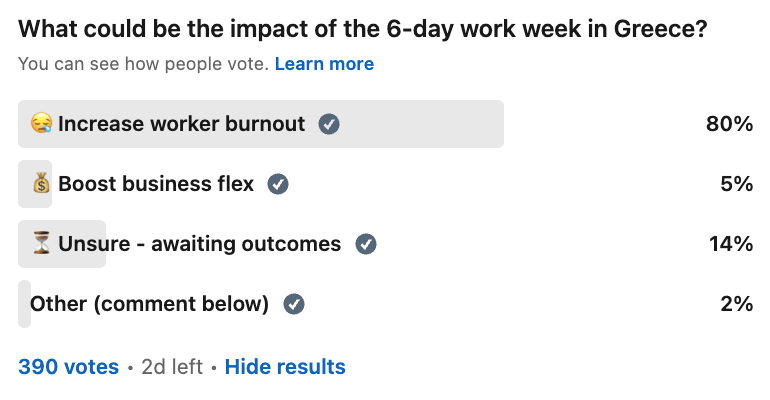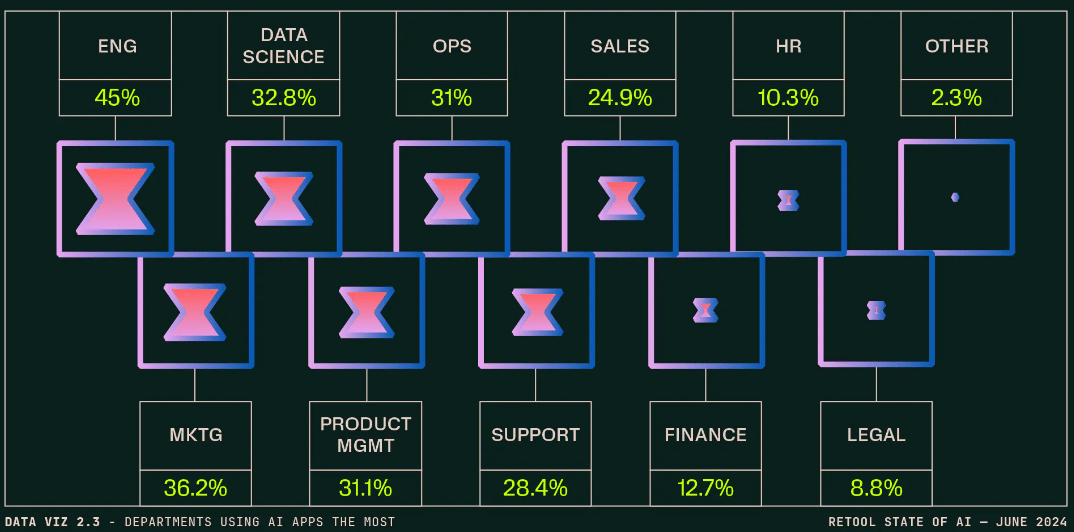- Work Smarter With AI
- Posts
- 6-Day Workweek: Opportunity or Overload?
6-Day Workweek: Opportunity or Overload?
First EU country is doing this...
Aloha friends,
I hope you are enjoying the start of summertime 🏝️ 🌞
In today’s edition, we cover:
Let’s get this going!
🧠 Struggling With AI Adoption? This Is For You!
My friends at Springworks are hosting another incredible event to help you master AI adoption.
Join for free their upcoming virtual conference - The Shape of Work: AI x HR Playbook for 2024.
📅 Date: 10 July 2024 | Time: 1:00 PM - 3:00 PM EST
As a bonus, you’ll get full access to content from the previous edition, including my keynote on “How to Assess your AI Readiness”.
🇬🇷 Greece Introduces 6-Day Workweek
Let's kick things off with the topic of working… longer. Instead of the much-discussed 4-Day Work Week, one country is moving in the opposite direction.
Next month, as the first EU country, Greece will roll out a controversial 6-day workweek law, promising workers an additional 40% of their daily wage for the sixth day.
On one hand, this policy might seem like a financial boon for workers, offering them a chance to earn more. On the other hand, it raises significant concerns about employee well-being and productivity.
While more working days could mean higher income, it does not necessarily translate to more effective or efficient work. Increasing work hours without addressing the underlying productivity issues could lead to burnout and decreased overall performance. My main question is: are we addressing the root issue, or simply adding to the burden?
A few days ago, I asked you on LinkedIn what are your thoughts… Here are the results so far.

The discussion in the comments was pretty heated, with some highlights.
Pro 6-Day Workweek
Yannis Giannopoulos: "Most workers in Greece already work 12-hour shifts 6-7 days a week for a lousy 800 EUR a month, so this is definitely a good thing."
Marouscha Dorenbos: "If this applies to all jobs, not just remote ones, it could be a good thing for many workers in the hospitality industry."
Against 6-D-WW
Anna Maria Kochanska: "This is so irrational. Modern countries are introducing a 4-day week, and Greece goes to 6-days! The salaries in Greece are so low that many people will probably take this as an opportunity to earn more, but they will end up working 6 days for a salary that is still low."
Ricardo Daza: "Colombia has this and we are like one of the less productive nations in the world."
Muhammad Ahmed: "In my company, we used to have a 6-day workweek, but switching to 5 days boosted productivity, team morale, and energy levels. They don't delay work for any reason, and we've seen an increase in company sales."
Michelle Coulson: "Have we gone back in time?"
As I think about the pros and cons, I wonder: should we focus on closing the productivity gap first? What are your thoughts?
⌛️ HR Is Lagging on Adopting AI - How To Fix This?
Shifting gears towards AI (which, by the way, is supposed to help us work less?), let’s look at which departments are leading the way.
Hint - it’s not HR…
According to the latest State of AI report by Retool, HR's AI adoption rate is only 10.3%, significantly lower than other departments like Engineering and Marketing.
Only 10%!!! Are you surprised?! I am…

Several challenges contribute to this slow uptake:
Technical Hurdles: HR teams often lack the technical expertise and familiarity with no-code tools, making AI adoption daunting.
Overwhelmed Workforce: HR professionals are already juggling numerous responsibilities. The sudden addition of AI and remote work tools adds to their burden.
Pain Points: Key issues include model output accuracy/hallucinations (38.9%) and data access/security (33.5%).
Trust Issues: Overall trust in AI models is low, averaging 6.1 out of 10.
The slow adoption of AI in HR comes with significant drawbacks.
Efficiency Loss: Without AI, HR continues to spend significant time on manual, repetitive tasks.
Missed Opportunities: Potential improvements in recruitment, employee engagement, and performance management are left unexplored.
To address these challenges and unlock AI’s potential in HR, I see two main things that would help:
Focus on High-Impact Areas: Start with AI applications that address the most pressing HR tasks, demonstrating quick wins and building confidence in AI tools.
Training and Education: Implement comprehensive training programs to help HR teams become comfortable with AI and no-code tools.
What’s the best way to combine it? Organize an internal AI-Hackathon.
👉️ Have you tried organizing it already AI-Hackathon? If not, check this out. 👈️
AI Hackathon offers a dynamic, hands-on session where employees can collaboratively tackle existing challenges using AI.
* No-code: you don't need to know programming
* Instant solutions: build prototypes in hours
It enables individual contributors and team leaders to build no-code AI-Assistants using AI-Mentor platform for specific work use-cases. We’ve already hosted sessions for over 600 people, and the feedback was very positive!
“This is an eye to the future.”
“I can’t stop - I will do it for the whole day.”
“I am flying here!”
So… once you get people together, what should you build? Here are some specific use cases for HR you should explore: segmented into automation and augmentation.
Augmentation
Employee Engagement: AI-Assistants to enhance communication, offer personalized support, and track employee sentiment.
Learning and Development: AI-Assistants provide tailored learning paths based on individual skill gaps and career goals.
Talent Management: AI Data Analyst analyzes large datasets eg. employee interviews, or 1:1’s to identify patterns, predict attrition, and suggest retention strategies.
Strategic Planning: Personalized AI-Assistants to help in workforce planning, analyzing trends, and supporting decision-making with predictive analytics.
Automation
AI can automate many repetitive and time-consuming HR tasks, freeing up professionals to focus on more strategic activities. Here are some areas where automation can drive efficiency.
Recruitment: AI drafts personalized job postings, screens candidates, and provides feedback.
Employee Support Chatbots: AI-driven chatbots offer 24/7 support, handle inquiries, and automate routine tasks.
Performance Management: AI aggregates performance data to provide real-time feedback and development recommendations.
Administrative Tasks: AI automates administrative tasks, freeing HR professionals from mundane work.
HR's slow adoption of AI is a significant challenge, but it's also a tremendous opportunity. By focusing on high-impact areas and providing comprehensive training, HR departments can unlock the potential of AI to streamline operations and improve employee engagement. It's time to embrace AI, not just to keep pace with other departments, but to lead the way in creating more efficient and effective workplaces.
What techniques have worked for your HR team in adopting AI?
Reply to this email or connect with me on LinkedIn to share your feedback and ideas.
That’s all for today’s edition!
Remember, if you’re struggling with AI adoption, don’t miss the upcoming virtual conference to learn the “AI x HR Playbook.” 👉️ Save your seat now.
PS. Together with Luna and Coconut, we are sending good vibes your way!

Until next time!
Iwo

Reply